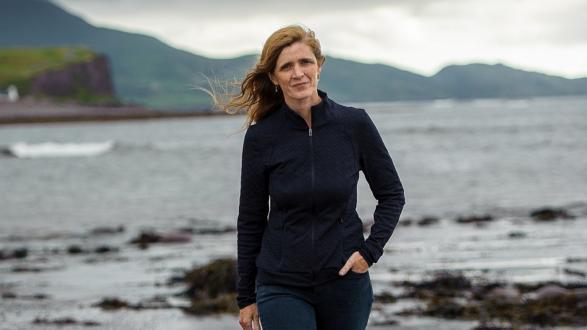THE EDUCATION OF AN IDEALIST: A CONVERSATION WITH AMB. POWER
June 5, 2020
Ambassador Samantha Power spoke with Ambassador Nancy Rubin about the global crisis of the pandemic and how values-based leadership—especially from the United States—is a necessary part of the solution.
Here are takeaways from the discussion:
- Ambassador Rubin started by asking Ambassador Power how the current pandemic, plus national protests over police brutality and systemic racism, is expected to impact the 2020 political climate. Power replied by saying the president has a broader reach and voice at the moment, though that voice often goes to a place of fueling the greatest divisions and demons, and fueling fear, panic, and hate, with exclusionary language during a time when we really need calm solutions. “For gifted orators and subtle minds, this is a hard moment,” Power said. There are other voices contributing to the national narrative, but there are big structural advantages to being the president, she said.
- Ambassador Rubin: “There has been a decay of social, economic, and political institutions. You (Samantha) were our best asset during the Ebola crisis, and America’s capacity for forging powerful commissions remains unmatched. What should be America’s role in the pandemic?”
- Power: “International, intergovernmental bodies need powerful governments to pool their resources, make compromises, and be a catalytic first-mover—this has been the United States historically. We get others to step up when we can. [During Ebola], the United States mobilized other partners (like France, the UK, Germany) to take a role and support countries throughout Africa. This approach changed the casualty account to be less than expected.”
- China will not lead a collective international response in the same way. Power noted that China does things bilaterally; they want to advance their brand and get leverage over other countries to change the rules of the road of international organizations. Now that the United States is in a period of retreat, the future turns on whether the United States, China, the UK, or even India—the countries with leverage and resources—will ultimately dictate the prognosis for international institutions.
- Power said that private sector actors like Bill Gates are doing more on COVID-19 than the U.S. federal government. The private sector—in partnership with states and cities—is the way of the future.
- In our diplomacy and engagement with other countries, Power said, it’s important to be clear that our advocacy is on behalf of the American people, the American worker. “However, the foundational challenges we face can’t be dealt with without public officials who share your values,” she added.
- When the problem is huge, Power said, it feels like you need to find a huge solution. “But instead, focus on your slice of the solution.”
- Finally, Power stressed that the U.S. diplomatic corps needs to have more diversity—in terms of gender, religion, race, and professional background, including people from the technology sector.
_______________________
The views and opinions expressed here are those of the speakers and do not necessarily reflect the official policy or position of the Pacific Council.




